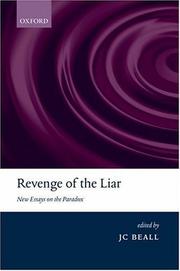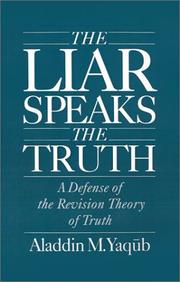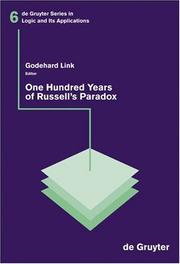| Listing 1 - 7 of 7 |
Sort by
|
Book
ISBN: 9786610524112 0195363094 1280524111 0198021755 9780198021759 9781280524110 019505072X 9780195050721 Year: 1987 Publisher: New York Oxford University Press
Abstract | Keywords | Export | Availability | Bookmark
 Loading...
Loading...Choose an application
- Reference Manager
- EndNote
- RefWorks (Direct export to RefWorks)
This monograph purports to provide a solution to semantical paradoxes like ""the liar"". The authors base this solution on J.L.Austin's idea of truth, which is fundamental to situation semantics, and compare two models of language, propositions and truth.
Liar paradox. --- Liar paradox --- Logic --- Philosophy --- Philosophy & Religion --- Antinomy of the liar --- Epimenidean paradox --- Liar antinomy --- Paradox of Epimenides --- Paradox of Russell --- Paradox of the liar --- Russell's paradox --- Paradox --- Semantics (Philosophy)

ISBN: 1281150541 9786611150549 0191528501 9780191528507 9780199233915 0199233918 9780199233908 019923390X 9781281150547 6611150544 019923390X 0199233918 1383036799 Year: 2007 Publisher: Oxford New York Oxford University Press
Abstract | Keywords | Export | Availability | Bookmark
 Loading...
Loading...Choose an application
- Reference Manager
- EndNote
- RefWorks (Direct export to RefWorks)
J.C. Beall presents 14 new essays and an extensive introduction, which examine the nature of the liar paradox and its resistance to any attempt to solve it.
Liar paradox. --- Antinomy of the liar --- Epimenidean paradox --- Liar antinomy --- Paradox of Epimenides --- Paradox of Russell --- Paradox of the liar --- Russell's paradox --- Logic --- Paradox --- Semantics (Philosophy)
Book
ISBN: 3869458577 9783869458571 9783959480505 Year: 2015 Publisher: Nordhausen
Abstract | Keywords | Export | Availability | Bookmark
 Loading...
Loading...Choose an application
- Reference Manager
- EndNote
- RefWorks (Direct export to RefWorks)
Liar paradox. --- Antinomy of the liar --- Epimenidean paradox --- Liar antinomy --- Paradox of Epimenides --- Paradox of Russell --- Paradox of the liar --- Russell's paradox --- Logic --- Paradox --- Semantics (Philosophy)

ISBN: 1280526904 0198024495 1429407913 9781429407915 9781280526909 0195083431 9780195083439 0197730752 Year: 1993 Publisher: New York Oxford University Press
Abstract | Keywords | Export | Availability | Bookmark
 Loading...
Loading...Choose an application
- Reference Manager
- EndNote
- RefWorks (Direct export to RefWorks)
The concept of truth has been the focus of much attention in philosophical literature, but has resisted adequate explanation. This study explores a "deflationary" or "minimalist" account of truth that can account for the challenge posed by semantic paradoxes such as the liar.
Liar paradox. --- Truth. --- Conviction --- Belief and doubt --- Philosophy --- Skepticism --- Certainty --- Necessity (Philosophy) --- Pragmatism --- Antinomy of the liar --- Epimenidean paradox --- Liar antinomy --- Paradox of Epimenides --- Paradox of Russell --- Paradox of the liar --- Russell's paradox --- Logic --- Paradox --- Semantics (Philosophy)
Book
ISBN: 311032458X 9783110324587 3868381724 9783868381726 3110324369 9783110324365 9781299722514 1299722512 9783868381726 9783110324365 Year: 2012 Publisher: Heusenstamm [Germany] Ontos Verlag
Abstract | Keywords | Export | Availability | Bookmark
 Loading...
Loading...Choose an application
- Reference Manager
- EndNote
- RefWorks (Direct export to RefWorks)
The problem of truth and the liar paradox is one of the most extensive problems of philosophy. The liar paradox can be avoided by assuming a so-called theory of partial truth instead of a classical theory of truth. Theories of partial truth, however, cannot solve the so-called strengthened liar paradox, which is the problem that many semantic statements about the so-called strengthened liar cannot be true in a theory of partial truth. If such semantic statements were true in the theory, another paradox would emerge. To proponents of contextual accounts, which assume that the concept of truth is context-dependent, the strengthened liar paradox is the core of the liar problem. This book provides an overview of current contextual approaches to the strengthened liar paradox. For this purpose, the author investigates formal theories of truth that result from formal reconstructions of such contextual approaches.
Truth. --- Liar paradox. --- Antinomy of the liar --- Epimenidean paradox --- Liar antinomy --- Paradox of Epimenides --- Paradox of Russell --- Paradox of the liar --- Russell's paradox --- Logic --- Paradox --- Semantics (Philosophy) --- Conviction --- Belief and doubt --- Philosophy --- Skepticism --- Certainty --- Necessity (Philosophy) --- Pragmatism

ISBN: 1282194801 9786612194801 3110199688 3110174383 9783110199680 9783110174380 9781282194809 Year: 2004 Volume: 6 Publisher: Berlin New York Walter de Gruyter
Abstract | Keywords | Export | Availability | Bookmark
 Loading...
Loading...Choose an application
- Reference Manager
- EndNote
- RefWorks (Direct export to RefWorks)
Die in diesem Band zusammengefassten Beiträge stellen die wesentlichen Forschungsergebnisse der internationalen Münchner Konferenz "100 Jahre Russell-Paradoxon" im Jahr 2001 dar, auf der an die Entdeckung des berühmten Russell Paradoxons vor 100 Jahren erinnert wurde. Die 31 Beiträge und der Einführungsessay des Herausgebers wurden alle - bis auf zwei Ausnahmen - ursprünglich für diesen Band verfasst. The papers collected in this volume represent the main body of research arising from the International Munich Centenary Conference in 2001, which commemorated the discovery of the famous Russell Paradox a hundred years ago. The 31 contributions and the introductory essay by the editor were (with two exceptions) all originally written for the volume. The volume serves a twofold purpose, historical and systematic. One focus is on Bertrand Russell's logic and logical philosophy, taking into account the rich sources of the Russell Archives, many of which have become available only recently. The second equally important aim is to present original research in the broad range of foundational studies that draws on both current conceptions and recent technical advances in the above-mentioned fields. The volume contributes therefore, to the well-established body of mathematical philosophy initiated to a large extent by Russell's work.
Paradox. --- Liar paradox. --- Antinomy (Logic) --- Argument du menteur --- Avocat [Paradoxe de l' ] --- Barbier [Paradoxe du ] --- Epimenidean paradox --- Imprédicable de Grelling [Paradoxe de l' ] --- Leugenaar [Paradox van de ] --- Liar antinomy --- Liar paradox --- Menteur [Paradoxe du ] --- Paradox --- Paradox of Epimenides --- Paradox of Russel --- Paradox of the Liar --- Paradox van de leugenaar --- Paradoxe --- Paradoxe d'Épiménide --- Paradoxe de Russell --- Paradoxe de Sancho Pança --- Paradoxe de l'avocat --- Paradoxe de l'imprédicable de Grelling --- Paradoxe de violation de lois internes --- Paradoxe des relations --- Paradoxe du barbier --- Paradoxe du menteur --- Relations [Paradoxe des ] --- Russel's paradox --- Russell [Paradoxe de ] --- Sancho Pança [Paradoxe de ] --- Violation de lois internes [Paradoxe de ] --- Épiménide [Paradoxe d' ] --- Antinomy of the liar --- Paradox of Russell --- Paradox of the liar --- Russell's paradox --- Logic --- Semantics (Philosophy) --- Figures of speech --- Contradiction
Book
ISBN: 1402084684 1402084676 9048178886 Year: 2008 Publisher: Dordrecht : Springer,
Abstract | Keywords | Export | Availability | Bookmark
 Loading...
Loading...Choose an application
- Reference Manager
- EndNote
- RefWorks (Direct export to RefWorks)
The Liar Paradox challenges logicians’ and semanticists’ theories of truth and meaning. Modern accounts of paradoxes in formal semantics offer solutions through the hierarchy of object language and metalanguage. Yet this solution to the Liar presupposes that sentences have unique meaning. This assumption is non-controversial in formal languages, but an account of how “hidden meaning” is made explicit is necessary to any complete analysis of natural language. Since the Liar Paradox presents itself as a sentence uniting contradictory meanings, appreciating how they can be united in a single sentence may provide new insights into this and other paradoxes. This volume includes a target paper, taking up the challenge to revive, within a modern (formal) framework, a medieval solution to the Liar Paradox which did not assume Uniqueness of Meaning. Stephen Read, author of the target paper, attempts to formally state a theory of truth that dates back to the 14th century logician Thomas Bradwardine; the theory offers a solution to the Liar Paradox in which the Liar sentence turns out to be false. The rest of the volume consists of papers discussing and/or challenging Read’s – and Bradwardine’s -- views one the one hand, and papers addressing the doctrinal and historical background of medieval theories of truth on the other hand. It also includes a critical edition of Heytesbury’s treatise on insolubles, closely related to Bradwardine’s view. Including formal, philosophical and historical discussions, this volume intends to renew the debate about paradoxes and theory of truth, and to show that the interest of earlier medieval work is not merely historical but, on the contrary, still relevant for modern, formal semantic theory. It is of interest for both professional philosophers and advanced students of philosophy.
Liar paradox. --- Truth. --- Semantics (Philosophy) --- Antinomy of the liar --- Epimenidean paradox --- Liar antinomy --- Paradox of Epimenides --- Paradox of Russell --- Paradox of the liar --- Russell's paradox --- Logic --- Paradox --- Intension (Philosophy) --- Logical semantics --- Semantics (Logic) --- Semeiotics --- Significs --- Syntactics --- Unified science --- Language and languages --- Logic, Symbolic and mathematical --- Logical positivism --- Meaning (Psychology) --- Philosophy, Modern --- Semiotics --- Signs and symbols --- Symbolism --- Analysis (Philosophy) --- Definition (Philosophy) --- Conviction --- Belief and doubt --- Philosophy --- Skepticism --- Certainty --- Necessity (Philosophy) --- Pragmatism --- Logic. --- Linguistics --- Semantics. --- Philosophy, medieval. --- Philosophy of Language. --- Medieval Philosophy. --- Philosophy. --- Medieval philosophy --- Scholasticism --- Formal semantics --- Semasiology --- Semiology (Semantics) --- Comparative linguistics --- Information theory --- Lexicology --- Argumentation --- Deduction (Logic) --- Deductive logic --- Dialectic (Logic) --- Logic, Deductive --- Intellect --- Psychology --- Science --- Reasoning --- Thought and thinking --- Methodology --- Language and languages—Philosophy. --- Medieval philosophy. --- Semiotics. --- Philosophy, Medieval. --- Semiology (Linguistics) --- Semantics --- Structuralism (Literary analysis)
| Listing 1 - 7 of 7 |
Sort by
|

 Search
Search Feedback
Feedback About UniCat
About UniCat  Help
Help News
News